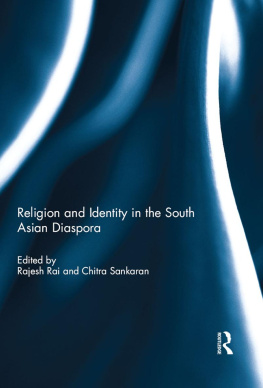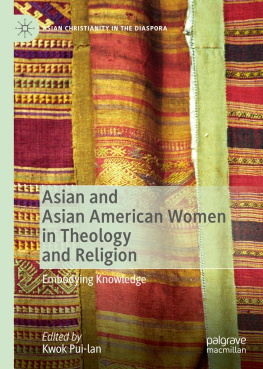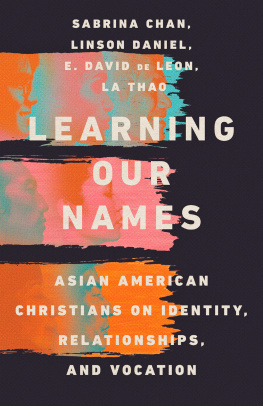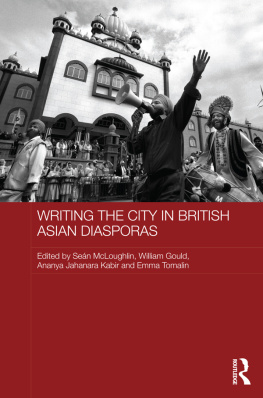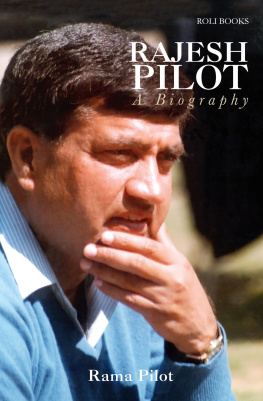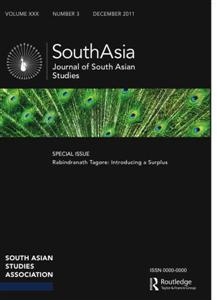Religion and Identity in the South Asian Diaspora
Religious identity constitutes a key element in the formation, development and sustenance of South Asian diasporic communities. Through studies of South Asian communities situated in multiple locales, this book explores the role of religious identity in the social and political organization of the diaspora. It accounts for the factors that underlie the modification of ritual practice in the process of resettlement, and considers how multicultural policies in the adopted state, trans-generational changes and the proliferation of transnational media has impacted the development of these identities in the diaspora. Also crucial is the gender dimension, in terms of how religion and caste affect womens roles in the South Asian diaspora. What emerges then from the way separate communities in the diaspora negotiate religion are diverse patterns that are strategic and contingent. Yet, paradoxically, the dynamic and evolving relationship between religion and diaspora becomes necessary, even imperative, for sustaining a cohesive collective identity in these communities.
This book was published as a special issue of South Asian Diaspora.
Rajesh Rai is Assistant Professor in the South Asian Studies Programme at the National University of Singapore. Co-editor of The Encyclopedia of the Sri Lankan Diaspora (2013), The South Asian Diaspora: Transnational Networks and Changing Identities (2009), Nationalism in South Asia (2009), he was also Assistant Editor for The Encyclopedia of the Indian Diaspora (2006), which has received considerable acclaim. His articles have been published in Modern Asian Studies, South Asia: Journal of South Asian Studies, Journal of Southeast Asian Studies, South Asian Diaspora and elsewhere. His research interests are in the fields of diaspora studies and transnational identities, nationalism and the post-colonial history and politics of South Asia.
Chitra Sankaran is Associate Professor in the Department of English Language and Literature at the National University of Singapore. She has published monographs, books, edited volumes and chapters in books. Her articles have been published in The Journal of Commonwealth Literature, ARIEL, World Literatures Written in English, Journal of South Asian Literatures and elsewhere. Her research interests include South Asian Fictions and Comparative Literatures.
Religion and Identity in the South Asian Diaspora
Edited by
Rajesh Rai and Chitra Sankaran
First published 2014
by Routledge
2 Park Square, Milton Park, Abingdon, Oxon, OX14 4RN
and by Routledge
711 Third Avenue, New York, NY 10017
Routledge is an imprint of the Taylor & Francis Group, an informa business
2014 Taylor & Francis
All rights reserved. No part of this book may be reprinted or reproduced or utilised in any form or by any electronic, mechanical, or other means, now known or hereafter invented, including photocopying and recording, or in any information storage or retrieval system, without permission in writing from the publishers.
Trademark notice: Product or corporate names may be trademarks or registered trademarks, and are used only for identification and explanation without intent to infringe.
British Library Cataloguing in Publication Data
A catalogue record for this book is available from the British Library
ISBN13: 978-0-415-70815-9
Typeset in Times New Roman
by Taylor & Francis Books
Publishers Note
The publisher accepts responsibility for any inconsistencies that may have arisen during the conversion of this book from journal articles to book chapters, namely the possible inclusion of journal terminology.
Disclaimer
Every effort has been made to contact copyright holders for their permission to reprint material in this book. The publishers would be grateful to hear from any copyright holder who is not here acknowledged and will undertake to rectify any errors or omissions in future editions of this book.
Contents
P. Pratap Kumar
Rajesh Rai and Chitra Sankaran
Rajesh Rai
Surendra Bhana and Kusum K. Bhoola
Ins Loureno
Anjana Narayan and Bandana Purkayastha
Shanthini Pillai and Sharenee Philomena Paramasivam
Anjali Gera Roy
John Whalen-Bridge
Jeffrey Samuels
The chapters in this book were originally published in South Asian Diaspora, volumes 1 and 3, issue 1 (March 2011). When citing this material, please use the original page numbering for each article, as follows:
Editorial
P. Pratap Kumar
South Asian Diaspora, volume 3, issue 1 (March 2011) pp. 14
Religion and the South Asian diaspora
Rajesh Rai and Chitra Sankaran
South Asian Diaspora, volume 3, issue 1 (March 2011) pp. 514
Homogenisation and fragmentation, inclusivism and exclusion in the development of Hinduism in Singapore
Rajesh Rai
South Asian Diaspora, volume 1, issue 1 (March 2011) pp. 317
The dynamics of preserving cultural heritage: the case of Durbans Kathiawad Hindu Seva Samaj, 19431960 and beyond
Surendra Bhana and Kusum K. Bhoola
South Asian Diaspora, volume 3, issue 1 (March 2011) pp. 1536
Religion and gender: the Hindu diaspora in Portugal
Ins Loureno
South Asian Diaspora, volume 3, issue 1 (March 2011) pp. 3752
Talking gender superiority in virtual spaces: web-based discourses of Hindu student groups in the US and UK
Anjana Narayan and Bandana Purkayastha
South Asian Diaspora, volume 3, issue 1 (March 2011) pp. 5370
From the fringes of the diasporic garment: creative pageants of Indian Christian identity from Malaysia and Singapore
Shanthini Pillai and Sharenee Philomena Paramasivam
South Asian Diaspora, volume 3, issue 1 (March 2011) pp. 7188
Celebrating the sons of Jats: the return of tribes in the global village
Anjali Gera Roy
South Asian Diaspora, volume 3, issue 1 (March 2011) pp. 89102
Multiple modernities and the Tibetan diaspora
John Whalen-Bridge
South Asian Diaspora, volume 3, issue 1 (March 2011) pp. 103116
Forget not your old country: absence, identity, and marginalization in the practice and development of Sri Lankan Buddhism in Malaysia
Jeffrey Samuels
South Asian Diaspora, volume 3, issue 1 (March 2011) pp. 117132
Please direct any queries you may have about the citations to clsuk.permissions@cengage.com
There is a growing interest in the role that religion plays in the diaspora in promoting identity and providing an avenue for social networking. In many diasporic contexts, religious organizations have provided much needed moral and social support to immigrant communities and often facilitated the process of immigration. Recent scholarship in this area is significant. It is in this context that the essays in this Special Issue deal with a range of issues associated with religion in the diaspora.
There is significant evidence to suggest that most religious organizations that were started by the Indian diaspora also offered educational facilities for the community. It is through them that language and religious education was pursued. In doing so, such organizations also provided an identity to the community. Such identity came to be constructed both along the lines of general Indian-ness as well as in the sense of a specific ethnic identity. In the context of transnationalism and globalization, religious communities, through their various religious institutions, have more often than not, also entrenched narrower ethnic identities. A good example is the Swaminarayan community in the UK and USA where they have perpetuated through their institutional approach a unique Gujarati linguistic or ethnic identity. Another example is evident in the experience of the Sikh community which illustrates how religious communities entrench ethnic identities within the context of globalization through their transnational networks that run along ethnic lines rather than along broader national lines. Therefore, it is not sufficient to approach transnational identities through broad categories of nationalities, but rather, there is a need also to look at the transnational networks along ethnic lines.


